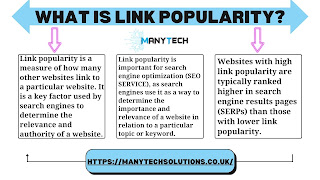What are the 4 building blocks of SEO?
1.
Technical
SEO: Technical SEO refers to the optimization of a website's technical
elements to improve its search engine ranking. Some examples of technical SEO
factors include:
- Website
speed: A fast website is important for both user experience and SEO. This
can be achieved by optimizing images, reducing HTTP requests, and
minifying code.
- Mobile-friendliness:
As mobile devices continue to dominate internet usage, it's essential for
a website to be mobile-friendly. This means the website should be
responsive and easily navigable on small screens.
2.
On-page
SEO: On-page SEO refers to the optimization of the content on a website to
make it more relevant and valuable to users and search engines. Some examples
of on-page SEO SERVICE factors include:
- Keyword
research: Before creating content, it's important to research relevant
keywords and phrases that people are searching for. This can help to
target the right audience and improve the chances of ranking for those
keywords.
- Title
tags and meta descriptions: These are HTML tags that appear in search
engine results pages (SERPs). They should be optimized to accurately
describe the content on the page and include relevant keywords.
- Off-page SEO: Off-page SEO refers
to the optimization of factors that occur outside of the website to
improve its authority and reputation. Some examples of off-page SEO
factors include:
- Link
building: Building high-quality backlinks from other relevant websites is
one of the most important factors in off-page SEO. This can be achieved
through guest blogging, broken link building, and outreach to influencers
and bloggers.
- Social
media: Having a strong social media presence can help to drive traffic to
a website and improve its authority. This includes creating engaging
content and building a following on platforms such as Twitter, Facebook,
and LinkedIn.
- Content marketing: Content
marketing involves creating high-quality, informative, and engaging content
that attracts and retains visitors to a website. This includes:
- Blogging:
Regularly publishing blog posts on a website can help to attract visitors
and improve its authority. The content should be optimized for keywords
and be valuable to the reader.
- Video
marketing: Video is becoming an increasingly popular way to consume
content. Creating informative and engaging videos can help to drive
traffic to a website and improve its reputation.




Comments
Post a Comment